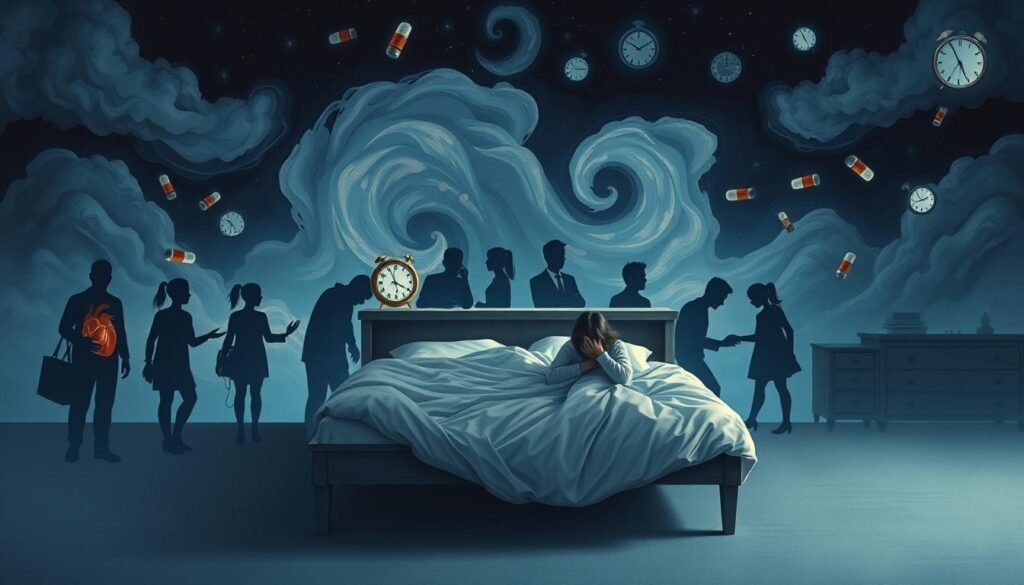Did you know that one in three adults in the United States report insomnia symptoms? This fact points to the broad impact of chronic insomnia, affecting 10% to 15% of people. Those facing it deal with more than just sleepless nights.
Chronic insomnia disrupts daily life and increases the risk of mental health issues. It’s also tied to more workplace accidents and long-term health problems. Understanding its complex causes is key to tackling it, as the National Sleep Foundation shows. Knowing why insomnia happens can help us find effective ways to enhance well-being.
Key Takeaways
- Chronic insomnia affects about 10% to 15% of adults.
- Approximately 33% of the adult population experiences insomnia symptoms.
- Higher prevalence is found among divorced or widowed individuals.
- Older adults, particularly females and the White population, show increased rates of chronic insomnia.
- Chronic insomnia significantly raises the risk of depression, anxiety, and other psychiatric illnesses.
- An estimated 40-50% of those with insomnia also have another mental disorder.
- Implementing better sleep strategies can mitigate these concerning outcomes. For more in-depth information, explore the causes of chronic insomnia according to the National Sleep.
Understanding Chronic Insomnia
Chronic insomnia means having trouble sleeping for a month or more. Most chronic insomnia is secondary, happening because of other health issues, medicines, or sleep problems. It’s key to know the factors that lead to insomnia, like who it affects and why.
Women and older adults often struggle with insomnia more than others. Stress, depression, earning less, working night shifts, and jet lag are main risk factors. Also, African Americans face more sleep issues than White people.
Signs of insomnia include:
- Trouble falling asleep
- Sleeping for short periods
- Waking up often at night
- Feeling tired after waking up
- Waking up too early
These symptoms can cause problems during the day like feeling tired, moody, or having trouble thinking clearly. Insomnia can make people very sleepy in the daytime. This can lead to dangerous situations like falling asleep while driving.
About 10% to 30% of adults have insomnia. Plus, around 35% of U.S. adults get less than seven hours of sleep a night. It’s crucial to understand insomnia to find effective ways to treat it.
Symptoms of Chronic Insomnia
Chronic insomnia shows up in many ways that mess with daily life. About 10% to 30% of adults often face insomnia symptoms. These include trouble getting to sleep, waking up a lot, and waking up early and not getting back to sleep.
To be diagnosed with chronic insomnia, these problems must happen at least three nights a week. They must also last for three months or more.
Daytime effects are huge. People feel tired, crabby, and find it hard to focus. They may also find it tough to remember things. This can hurt how well they do their job or get along with others.
Some even feel very sleepy during the day. This makes their daily struggles even worse.
Insomnia can hit anyone, no matter their age. It can mess up normal sleep timings. It’s important to spot these symptoms early. Seeking help quickly can stop things from getting worse. This helps people get back to sleeping well again.
Common Causes of Chronic Insomnia
Every year, about 40 million people in the U.S. struggle with chronic insomnia. This issue stems from both psychological and physical causes. Mental health conditions like anxiety and depression play a big role in causing insomnia.
Conditions such as asthma or chronic pain can make sleeping hard. Common causes of chronic insomnia are often tied to stress and how we live. Not sticking to a regular sleep schedule can worsen the problem.
Your daily habits have a big impact on how well you sleep. Drinking too much caffeine or alcohol can mess up your sleep. Eating late, especially spicy foods, can cause discomfort, making it tough to fall asleep. Also, a bad sleeping space can prevent good rest.
Traveling through different time zones can mess up your internal clock. Insomnia can affect your thinking, attention, and energy. It can lead to feeling moody and having trouble at work or school.
| Cause | Impact on Sleep |
|---|---|
| Psychological Factors | Anxiety and depression can lead to difficulty falling asleep. |
| Medical Conditions | Chronic pain or illnesses can disrupt sleep quality. |
| Lifestyle Choices | Excess caffeine and poor eating habits negatively affect sleep. |
| Irregular Sleep Schedules | Inefficient sleep patterns result in an inability to maintain restful sleep. |
| Environmental Factors | Noisy or uncomfortable sleeping environments hinder sleep. |
| Time Zone Changes | Jet lag disrupts natural sleep rhythms. |
Knowing the common causes of chronic insomnia helps us fix it. Paying attention to our lifestyle can lead to better sleep. This means understanding how our choices affect our slumber is key to better health.
Stress and Its Role in Insomnia
Stress greatly affects how well we sleep. It’s often a main cause of long-term insomnia. Studies indicate that a big portion of adults struggle with insomnia due to high stress levels. This issue messes with our sleep architecture. It cuts down on our deep sleep and messes up REM sleep stages.
People under constant stress tend to have more sleep problems. This turns stress and insomnia into a repeating cycle.
The body’s stress response involves the hypothalamic-pituitary-adrenal (HPA) axis. Important hormones like cortisol and adrenaline make us feel too alert to relax at night. Long-lasting stress can lead to different types of stress. Each type has its own way of affecting sleep.

To handle stress and improve sleep, we can use several strategies. These methods can really help:
- Mindfulness and meditation practices
- Cognitive-behavioral therapy (CBT) focused on stress relief
- Regular physical exercise
- Establishing consistent sleep routines
- Practicing relaxation techniques such as deep breathing or yoga
If we don’t manage our stress, it might cause more problems. These could include obstructive sleep apnea or chronic conditions that impact our health. Using the right stress management tactics can boost our sleep quality. This improves our overall health, battling the negative impacts of stress and insomnia.
Inconsistent Sleep Schedules and Circadian Rhythm Disruption
Inconsistent sleep schedules shake up our natural sleeping patterns. Changes in the circadian rhythm, or internal clock, can lead to long-term insomnia. This happens due to shift work, lots of travel, or changing bedtimes. Such misalignments disrupt our sleep-wake cycle. Studies show that insomnia affects about 9% to 20% of American adults. This shows how common the issue is.
When people face irregular sleep-wake rhythms, their heart and metabolic health might be at risk. Odd work hours or jet lag can raise stress levels. This stresses the Hypothalamic-Pituitary-Adrenal axis, making it hard to fall asleep. Up to a third of shift workers may experience sleep-related symptoms.
To tackle these problems, it’s crucial to stick to a regular sleep schedule. Keeping consistent sleep and wake times helps adjust the circadian rhythm. Using strategies like a bedtime routine or bright light therapy improves sleep quality. People who gradually change their sleep times often feel more rested and productive.
Good sleep hygiene means keeping a regular sleep routine. It’s important to know how circadian rhythm disruption and erratic sleep affect us. Choosing a healthier lifestyle helps us enjoy better sleep and more energetic days.
Physical and Mental Health Conditions That Influence Insomnia
Chronic insomnia often mixes with many physical health issues and mental health problems. This makes a hard cycle for those affected. About 30% of adults say they have symptoms of insomnia, showing it’s common. Issues like chronic pain, diabetes, and breathing problems often lead to bad sleep.

Mental health plays a big role in insomnia, too. Disorders such as depression and anxiety are important factors. Studies show that 40% of people with insomnia also have a mental health condition. Depression is the most common among these.
Having insomnia makes daily life harder in many ways. People with it are more likely to have accidents because they can’t focus well. They also miss more days at work.
There’s even a big risk of getting depression linked to insomnia. This shows how important it is to look at how physical and mental health issues link to sleep problems. Getting to the root of these issues can help manage insomnia better. This improves life quality for those struggling with sleep issues.
Medications and Their Impact on Sleep Quality
Up to one-third of Americans struggle with insomnia. Medications play a big role in the quality of sleep, especially if they cause side effects that make insomnia worse. Drugs like antidepressants, steroids, and some blood pressure medicines can affect sleep. Knowing about these effects is important for anyone being treated for insomnia.
More people are getting prescriptions for insomnia, showing we’re paying more attention to it. From 1999 to 2010, prescriptions jumped from 5.3 million to 20.8 million. Yet, many still say their sleep quality is bad. About 34% of Americans call their sleep “poor” or “only fair.” This shows managing insomnia takes more than just medicine.
Some medications really affect how well we sleep:
| Medication Type | Examples | Impact on Sleep Quality |
|---|---|---|
| Benzodiazepines | Temazepam, Lorazepam | Work short-term but can cause dependence and withdrawal. |
| Z-Drugs | Zolpidem (Ambien), Eszopiclone (Lunesta) | They help you fall asleep faster but might have side effects like memory loss. |
| Antidepressants | Doxepin (Silenor) | They improve sleep with few bad effects. |
| Melatonin Receptor Agonists | Ramelteon (Rozerem) | Quite effective with less side effects. |
Medications and sleep quality are closely linked. Patients using benzodiazepines long-term face tough withdrawal symptoms, hurting their sleep. Meanwhile, drugs like zolpidem are good at fixing sleep time issues, but they must be used carefully. Low-dose doxepin is becoming a preferred choice for better sleep without harsh side effects.
For those with long-term insomnia, it’s crucial to see how different drugs affect sleep. Sometimes, changing medications or looking for alternatives can help sleep get better. Getting advice from healthcare professionals can find the best treatment for individual needs. For more on insomnia and treatment, check out these studies and insights.
Lifestyle Choices Contributing to Insomnia
Many adults, around 35%, face insomnia at some point. It’s often tied to daily habits. Knowing which lifestyle choices contribute to insomnia aids in tackling sleep issues.
One main issue is poor sleep hygiene. Inconsistent bedtimes disrupt your internal clock, making sleep hard to come by. Also, too much screen time before bed keeps your brain awake. Drinking too much caffeine later in the day also messes with your sleep.
Adopting good sleep hygiene tips can improve sleep. Here are key strategies for better rest:
- Stick to a regular sleep schedule, even on weekends.
- Develop a relaxing bedtime routine, like reading or light stretches.
- Ensure your bedroom is dark, cool, and quiet.
- Avoid screens at least an hour before bedtime.
- Watch your intake of caffeine and alcohol before sleeping.
Using these sleep hygiene tips can better your sleep gradually. Understanding how your daily actions affect sleep empowers you to improve.
Ignoring sleep hygiene can lead to more than just tiredness. About 10% to 15% suffer from chronic insomnia. This can lower your life quality and health. Paying attention to your lifestyle choices is key to better sleep and health.
Sleep Disorders Associated with Chronic Insomnia
Chronic insomnia often comes with other sleep disorders. Two main conditions linked to it are sleep apnea and restless leg syndrome. Sleep apnea means you stop breathing many times while asleep. This causes lots of wake-ups and hurts your sleep quality. Many with sleep apnea feel very sleepy and tired during the day. This makes their insomnia even worse.
Restless leg syndrome (RLS) is another issue, making you need to move your legs. This usually happens when you’re resting or at night. RLS makes it hard to get and stay asleep. It causes many to have restless nights. This adds to sleep problems.
It’s important to understand how these sleep issues and chronic insomnia are linked. Recognizing and treating other sleep disorders can help improve sleep overall. Sadly, many with chronic insomnia don’t know they have other conditions too. This can lead to long-term discomfort and lower life quality.
| Sleep Disorder | Description | Symptoms |
|---|---|---|
| Sleep Apnea | Breathing interruptions during sleep | Daytime fatigue, loud snoring, abrupt awakenings |
| Restless Leg Syndrome | Uncontrollable leg movements, especially at night | Leg discomfort, difficulty falling asleep, daytime sleepiness |
| Chronic Insomnia | Difficulty falling or staying asleep | Fatigue, mood disturbances, difficulty concentrating |
Over time, not treating sleep disorders can make chronic insomnia worse. This starts a cycle of poor sleep. Tackling these problems together can lead to better sleep. It boosts mental and physical health.
Addresses of Chronic Insomnia: Treatments and Strategies
About 10% to 30% of adults battle chronic insomnia, research shows. Effective treatment is key to improving life quality. Cognitive behavioral therapy for insomnia stands out for its effectiveness. It tackles sleep-disrupting thoughts and actions. It is a leading non-medication treatment, reducing the risks tied to sleep drugs.
Lifestyle changes can boost the benefits of cognitive therapy for insomnia. Advised steps include:
- Maintaining a consistent sleep schedule by going to bed and waking up at the same time each day.
- Creating a sleep environment that is quiet, cool, and dark.
- Avoiding heavy meals, nicotine, caffeine, and alcohol before bedtime.
While many opt for sleep meds, their safety and effectiveness differ greatly. Drugs like benzodiazepines and Z drugs pose abuse risks. However, alternatives like ramelteon have fewer side effects and help with falling asleep. For staying asleep issues, drugs like suvorexant can also be helpful.
But meds alone aren’t always the answer. The lack of qualified sleep therapists in the U.S. poses a problem. Yet, combining cognitive therapy with medications often works well.

| Method | Description | Classification |
|---|---|---|
| Cognitive Behavioral Therapy for Insomnia | Focuses on changing thoughts and behaviors affecting sleep | Non-drug treatment |
| Benzodiazepines | Commonly prescribed for insomnia but have potential health risks | Schedule IV controlled substance |
| Z Drugs | Non-benzodiazepine medications for sleep | Schedule IV controlled substance |
| Melatonin Agonists | Milder side effects, used for sleep onset issues | Prescription medication |
| Orexin Receptor Antagonists | Used for sleep maintenance insomnia | Schedule IV controlled substance |
Good sleep treatment is vital for health and well-being. This emphasizes the National Sleep Foundation’s role, which has been promoting sleep health for over 30 years. High-quality sleep improves overall health. It meets the 7 to 9 hours of sleep most adults need.
Understanding the Causes of Chronic Insomnia National Sleep Foundation
Chronic insomnia affects many people. About 1 in 10 people deal with mild insomnia at any time. Understanding chronic insomnia is key. The National Sleep Foundation finds it’s more common in women and the elderly.
Chronic insomnia means trouble sleeping for three nights a week, over three months. Many factors, like medical issues, sleep disorders, and lifestyle, play a role. Mental health and certain substances can make it worse.
The impact of chronic insomnia goes into the day. People often face headaches, low energy, and trouble with memory and thinking. They may feel irritable or moody. While sleeping pills help short-term, cognitive behavioral therapy (CBT) is better long-term. The National Sleep Foundation suggests treatments should be personalized.
- Insomnia symptoms may affect about 10% of the population at any given time.
- Women experience insomnia at twice the rate of men.
- Older adults with health issues are particularly vulnerable to insomnia.
- Shift workers face a higher likelihood of developing chronic insomnia.
Understanding chronic insomnia’s complexities helps in seeking the right treatment. Knowing the mix of biological, psychological, and environmental triggers can improve sleep quality and well-being.
Conclusion
Chronic insomnia affects between 40 to 70 million Americans. It poses big challenges to their sleep health. Knowing the causes of chronic insomnia, as the National Sleep Foundation shows, can help people deal with their sleep problems. It’s key to know about insomnia because many don’t get help for it. This can lead to ongoing sleep issues.
There are many reasons why people can’t sleep well. These include where they live, their health, and how they live day-to-day. Making good sleep a priority and changing some lifestyle habits can really help. Studies show that facing these problems directly is crucial for better sleep over time.
Resources like the National Sleep Foundation offer help for those dealing with insomnia. They provide information on how to sleep better and lessen insomnia’s negative effects. Talking to doctors is important, too. They can give a complete plan for getting back to good sleep, which improves life overall.
If you want to learn more about lack of sleep and sleep issues like insomnia, look at Sleep Foundation and Biotin Bloom. Understanding the symptoms and finding the right treatment is a big step towards better sleep health.